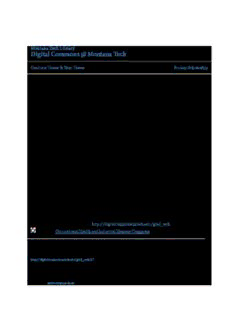
exposure assessment to respirable crystalline silica particles during airfield maintnenance PDF
Preview exposure assessment to respirable crystalline silica particles during airfield maintnenance
Montana Tech Library Digital Commons @ Montana Tech Graduate Theses & Non-Theses Student Scholarship Summer 2015 EXPOSURE ASSESSMENT TO RESPIRABLE CRYSTALLINE SILICA PARTICLES DURING AIRFIELD MAINTNENANCE CONCRETE OPERATIONS Kenneth Pratt Montana Tech of the University of Montana Follow this and additional works at:http://digitalcommons.mtech.edu/grad_rsch Part of theOccupational Health and Industrial Hygiene Commons Recommended Citation Pratt, Kenneth, "EXPOSURE ASSESSMENT TO RESPIRABLE CRYSTALLINE SILICA PARTICLES DURING AIRFIELD MAINTNENANCE CONCRETE OPERATIONS" (2015).Graduate Theses & Non-Theses. 37. http://digitalcommons.mtech.edu/grad_rsch/37 This Non-Thesis Project is brought to you for free and open access by the Student Scholarship at Digital Commons @ Montana Tech. It has been accepted for inclusion in Graduate Theses & Non-Theses by an authorized administrator of Digital Commons @ Montana Tech. For more information, please [email protected]. EXPOSURE ASSESSMENT TO RESPIRABLE CRYSTALLINE SILICA PARTICLES DURING AIRFIELD MAINTNENANCE CONCRETE OPERATIONS by Ken Pratt A report submitted in partial fulfillment of the requirements for the degree of MS Industrial Hygiene - Distant Learning Professional Track Montana Tech of The University of Montana 2015 i Abstract Crystalline silica is found in naturally occurring and manmade materials. According to OSHA, approximately 2.2 million people are exposed to silica each year (OSHA, 2002). These individuals are at an increased risk of silicosis, an incurable disease that is often fatal. The objective of this project was to determine if airport maintenance workers are exposed to crystalline silica over the current permissible exposure limit. Two days of sampling was conducted and it was determined that there was some exposure to the Airfield Paint Crew exceeding the action level. The highest employee exposure was at 0.362 mg/m3 with a corresponding PEL measured to be 0.455 mg/m3. The severity ratio has a score of 0.797 (any score greater than 1 is an overexposure). As shown by the mortality rates in several studies, there is evidence to suggest workers in the construction industry are at an increased risk of exposure to crystalline silica (NIOSH, 2008). This paper finally concludes that further sampling should be conducted to confirm the sampling results. If the results yield the same exposure, then the workers should be put into a respiratory protection program and engineering controls should be implemented to reduce exposure. Keywords: Crystalline Silica, Airport Maintenance Operations, Concrete Cutting, Paint Striping ii Dedication To Saranya, Natalie, Nathan, and Natasha, your unbridled support for me throughout my career and education. I couldn’t have done it without you! iii Acknowledgement I would like to acknowledge my employer, Salt Lake City Department of Airports for allowing me the time, materials, and financial backing for this project. I would like to particularly acknowledge Heidi Harward (Airport Safety Manager) for her faith and confidence in me during this time. Dr. Terry Spear and Montana Tech of the University of Montana, for approving and supporting this project iv Table of Contents ABSTRACT ................................................................................................................................................ II KEYWORDS: CRYSTALLINE SILICA, AIRPORT MAINTENANCE OPERATIONS, CONCRETE CUTTING, PAINT STRIPING ................................................................................................................................................................ II DEDICATION ........................................................................................................................................... III ACKNOWLEDGEMENT ............................................................................................................................. IV TABLE OF CONTENTS ................................................................................................................................ V LIST OF TABLES ...................................................................................................................................... VII LIST OF EQUATIONS ............................................................................................................................... VII LIST OF FIGURES .................................................................................................................................... VIII 1. INTRODUCTION ................................................................................................................................. 1 2. BACKGROUND ................................................................................................................................... 1 3. SILICOSIS .......................................................................................................................................... 2 3.1 Signs and Symptoms .......................................................................................................... 3 4. ROUTE OF EXPOSURE .......................................................................................................................... 3 5. MECHANISM OF TOXICITY .................................................................................................................... 4 5.1 Lungs .................................................................................................................................. 4 5.2 Kidneys ............................................................................................................................... 5 5.3 Chronic Toxicity .................................................................................................................. 5 5.4 Factors Influencing Toxicity ................................................................................................ 6 5.5 Elimination ......................................................................................................................... 7 5.6 Exposure Diagnostic Strategies .......................................................................................... 7 6. CONTROLS ........................................................................................................................................ 8 7. CURRENT REGULATORY EFFORTS .......................................................................................................... 9 v 8. PROPOSED REGULATORY EFFORTS ......................................................................................................... 9 9. OCCUPATIONAL EXPOSURE ................................................................................................................ 10 10. ENVIRONMENTAL EXPOSURE .............................................................................................................. 11 11. SIMILAR EXPOSURE GROUPS .............................................................................................................. 12 11.1 Airfield Maintenance Paint Crew ..................................................................................... 12 11.2 The Airfield Maintenance Concrete Crew ......................................................................... 13 12. SAMPLING METHODS ....................................................................................................................... 15 12.1 Sample Train .................................................................................................................... 15 12.2 Airfield Maintenance Concrete Crew ............................................................................... 16 12.3 Airfield Maintenance Paint Crew ..................................................................................... 17 12.4 Confounding Factors ........................................................................................................ 18 13. LABORATORY ANALYSIS ..................................................................................................................... 18 14. RESULTS ......................................................................................................................................... 19 14.1 Airfield Concrete Crew ...................................................................................................... 19 14.2 Airfield Paint Crew............................................................................................................ 19 14.3 Sampling Concentrations ................................................................................................. 20 14.4 Limitations........................................................................................................................ 20 15. CONCLUSION AND RECOMMENDATION ................................................................................................ 21 REFERENCES ........................................................................................................................................... 22 APPENDIX A DATA ................................................................................................................................. 26 APPENDIX B EQUATIONS ....................................................................................................................... 28 vi List of Tables Table 1 Instruments Used ..................................................................................................26 Table 2 Concrete Operations .............................................................................................26 Table 3 NMAM 0600 Respirable Dust - Concrete Crew ..................................................26 Table 4 NMAN 7500 Percent Crystalline Silica - Concrete Crew ....................................27 Table 5 OSHA Calculated PEL - Concrete Crew ..............................................................27 Table 6 NMAM 0600 Respirable Dust - Paint Crew .........................................................27 Table 7 NMAM 7500 Percent Crystalline Silica - Paint Crew ..........................................27 Table 8 OSHA Calculated PEL - Paint Crew ....................................................................27 List of Equations Equation 1 OSHA Permissible Exposure Limit.................................................................28 Equation 2 Volume ............................................................................................................28 Equation 3 Respirable Exposure ........................................................................................28 Equation 4 Severity Ratio ..................................................................................................28 Equation 5 Actual TWA ....................................................................................................28 Equation 6 8-Hour TWA ...................................................................................................28 vii List of Figures Figure 1 Molecular Structure of Silica (SBSJ, 2015) ...........................................................1 Figure 2 Crystalline Structure of Silica (Best, 2015) ...........................................................1 Figure 3 Non-Crystalline Structure of Silica (Best, 2015) ..................................................1 Figure 4 International Airport (Google Maps, 2014) ...........................................................2 Figure 5 Concrete Depth Taxiway “H” 16L/34R End of Runway Deice Project ...............2 Figure 6 Taxiway “H” 16L/34R End of Runway Deice Project ..........................................2 Figure 7 Environmental Exposure .....................................................................................12 Figure 8 Environmental Exposure .....................................................................................12 Figure 9 Air Paint Markings ..............................................................................................12 Figure 10 Airfield Concrete Repair ...................................................................................12 Figure 11 Bead Blaster.......................................................................................................13 Figure 12 Paint Grinder .....................................................................................................13 Figure 13 Paint Grinder .....................................................................................................13 Figure 14 Sweeper .............................................................................................................13 Figure 15 Equipment Cleaning ..........................................................................................13 Figure 16 Equipment Cleaning ..........................................................................................13 Figure 17 Concrete Crack ..................................................................................................14 Figure 18 Concrete Cutting ................................................................................................14 Figure 19 Jack Hammer .....................................................................................................14 Figure 20 Preparing for concrete .......................................................................................14 Figure 21 Mixing Epoxy ....................................................................................................14 viii Figure 22 Curing Epoxy.....................................................................................................14 ix
Description: